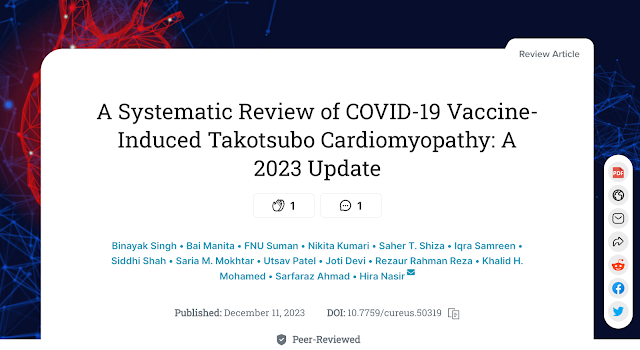COVID-19 Vaccines May Trigger Takotsubo Cardiomyopathy: Research

The clinical presentation of Takotsubo cardiomyopathy (TCM) resembles that of acute myocardial infarction, with common symptoms including acute chest pain and breathlessness. Its hallmark is impaired left ventricular function, typically occurring after intense emotional or physical stressors such as the death of a loved one, traumatic events, or severe illness. This condition, first identified by Japanese physician Dr. Hikaru Sato in 1990, is named “Takotsubo” due to the balloon-like bulging of the left ventricle, resembling the octopus-catching pot used in Japan.
A Case Study
In August, a case report was published in the journal Cureus detailing the experience of a 59-year-old woman who developed Takotsubo cardiomyopathy after receiving a booster dose of the COVID-19 vaccine. The patient experienced persistent dyspnea for six hours, prompting her visit to the emergency department. According to the patient’s account, she had been experiencing intermittent chest pain for the past two days, described as a stabbing sensation that progressively intensified with each episode but did not radiate to other areas. Exertion worsened the pain, and there was no relief method. The patient had received the Moderna vaccine booster dose three days prior.The patient did not have a fever and remained conscious, with a blood oxygen saturation of 89 percent and blood pressure at 150/90 mmHg. Crackling and rattling sounds known as crepitations were detected in her lungs. A COVID-19 polymerase chain reaction test yielded a negative result. The emergency electrocardiogram showed ST-segment elevation, a chest X-ray revealed pulmonary edema and an ultrasound indicated reduced left ventricular systolic function, with an estimated ejection fraction of 30 percent. Additionally, there was moderate hypokinesia (abnormally diminished motor activity) in the apex and anterior wall of the heart.
The patient continued to experience tachycardia and blood pressure fluctuations, leading to hemodynamic instability due to fluid overload and ultimately resulting in cardiac shock. The medical team administered intravenous injections of norepinephrine and dobutamine for treatment. As no other etiologies were identified, she was diagnosed with Takotsubo cardiomyopathy.
The patient showed improvement and was discharged on the sixth day but continued to experience persistent tachycardia, requiring treatment with metoprolol, a medication for the treatment of high blood pressure.
Before receiving the vaccine, the patient had a history of hyperlipidemia, hypothyroidism, and celiac disease. Additionally, she had smoked for five years but quit 15 years ago, and she had no history of alcohol consumption or drug abuse.
Takotsubo Cardiomyopathy Poses a Life-Threatening Risk
The association between COVID-19 vaccines and Takotsubo cardiomyopathy is not widely known, with only a few reported cases. On Dec. 11, a peer-reviewed study published in the journal Cureus consolidated and analyzed the evidence concerning COVID-19 vaccine-induced Takotsubo cardiomyopathy.The researchers conducted a literature search and included 15 case reports involving a total of 16 patients. Among them, 14 individuals received mRNA vaccines (Pfizer, Moderna), while two received viral vector vaccines (AstraZeneca). Seven patients developed Takotsubo cardiomyopathy after the first dose and seven after the second dose.
All patients exhibited elevated cardiac troponin levels, abnormal electrocardiogram findings, and reduced left ventricular ejection fraction on echocardiograms. The most predominant symptom among patients was chest pain, followed by dyspnea and nausea. Eventually, 14 patients recovered and were discharged, while two of the patients died.
The researchers noted that 87.5 percent of patients recovered and were discharged, indicating that Takotsubo cardiomyopathy occurring after vaccination is mostly “transient and reversible.” However, the death of 2 of the patients highlights the “potentially life-threatening nature of this vaccine-related adverse event.”
The paper’s authors urge clinicians to consider the possibility of Takotsubo cardiomyopathy, especially among recipients of mRNA vaccines when presented with patients experiencing chest pain or dyspnea symptoms after vaccination.
The study also mentioned that vaccines developed for COVID-19 have various side effects, including pain and swelling at the injection site, fever, headache, myalgia (muscle pain), fatigue, and nausea.
Reposted from: https://www.theepochtimes.com/health/research-covid-19-vaccines-may-trigger-takotsubo-cardiomyopathy-5552303
mRNA COVID Vaccines Form Spike Protein in Heart Cells, but Cause Different Anomalies: Research Article (October 2023)
Myocarditis and COVID-19 Vaccines: Special Report by The Epoch Times (September 2023)






.png)

Comments
Post a Comment